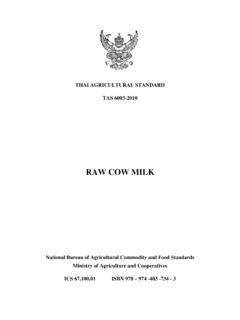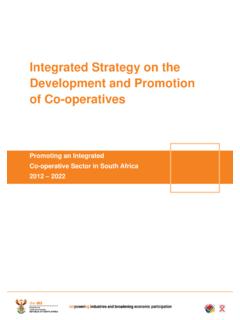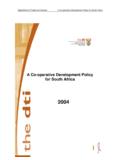Transcription of Outgrower Schemes Why Big Multinationals Link …
1 Outgrower Schemes Why Big Multinationals link up with African Smallholders* Katharina Felgenhauer and Denise Wolter Outgrower Schemes in the agricultural supply chain present opportunities for globally active firms and local smallholder farmers alike. Outgrower Schemes are attractive models for agro-food companies: they ensure control over sourced supply while at the same time granting access to local markets. Key ingredients for success are a long-term business interest and the development of mutual trust.
2 Africa is reappearing on the radar screen of international investors but so far they are concentrating on extractive industries, especially minerals and oil. For sure, despite its immense potential, Africa s agricultural sector does not lend itself easily to investment. Next to classic constraints such as insufficient infrastructure or insecure property rights, the production structure itself provides one of the most severe impediments to commercial development. African agriculture remains dominated by smallholder farmers working on fields of less than three hectares and it is not obvious for a foreign multinational to engage with small-scale farmers.
3 However, companies have actually found ways to effectively deal with this challenge through Outgrower Schemes . Outgrower Schemes , also known as contract farming, are broadly defined as binding arrangements through which a firm ensures its supply of agricultural products by individual or groups of farmers. In other words, ad hoc trade agreements are being replaced by co-ordinated commercial relations between producers, processors, and traders leading to a vertical integration of the agricultural value chain.
4 Under this umbrella, a variety of arrangements exist which differ in each partner s input and management. The following discussion will reveal why such partnerships are attractive for private firms and how they can succeed. The Prime Motivation: Ensuring Supplies Outgrower Schemes offer improved control over supply. Thus, large private companies demonstrate an interest in these partnerships if the desired produce is not easily available or quality standards insufficient. Tobacco, for example, is dependent on specific local soil and climate conditions so that British American Tobacco has contract farming Schemes to cover 70 per cent of its supply needs; the rest is provided by private suppliers, from Malawi or Zimbabwe.
5 The South African brewery SABM iller initiated contract farming Schemes in India and South Africa when yields turned out to be unsatisfactory. Through its direct involvement, the company injected management know-how and improved technology, so that standards Outgrower Scheme could be better implemented. As a result, the firm has enabled its producers to meet future supply requirements, thus ensuring the sustainability of these business relations..Exploring Local Markets Outgrower Schemes can also be attractive options for firms to explore local market opportunities.
6 SABM iller has engaged in smallholder-based production in Zambia and Uganda to get an excise tax break from the government but also to respond to local demand. Adapting products and prices to local preferences allows tapping into underexplored niches. Where the local market is targeted, home-grown approaches are on the rise. SABM iller aims to increase sourcing from Africa to between 60 and 70 per cent. The benefits are evident. Local sourcing minimises production and transaction costs while stimulating local demand.
7 Direct control over crop production also diminishes the vulnerability to commodity price fluctuations and facilitates the implementation of quality standards. A Long Term Perspective is Indispensable Smallholder-based contract farming Schemes are not easily implemented: they may take years to set up. Therefore, a long-term business interest is an indispensable pre-requisite. The US-based restaurant company Darden Restaurants got involved in African fish farming out of long-term self-interest in sustaining fish stocks.
8 However, it took them five years to set up the supply chain. Or as Alexandre Cantacuz ne, Senior Vice President for Asia, Oceania and Africa of the Swiss-based food and beverage company Nestl , puts it: We are in a country to stay. Nestl seeks only long-term engagements in Africa and has been present on the continent since the 19th century, irrespective of political and economic problems. Similarly, the Dutch cocoa processor ADM is going a long way to ensure its cocoa supplies in C te d Ivoire.
9 In this country, only two estates are bigger than 50 hectares; the rest of the cocoa production is done by about 800 000 smallholder farmers. Commerce is controlled by 500 licensed private traders (80 per cent) and 500 co-operatives (15 per cent), which supply 50 licensed exporters. ADM must therefore source mainly from co-operatives and has an interest in ensuring their sustainability. To achieve this end, ADM has developed a co-operative graduation scheme. When co-operatives have proved to be a reliable partner for two or three years of business, they gradually become eligible for technical training and extension services provided by ADM.
10 As the quality of the cocoa produced influences the price paid by ADM, co-operatives have a high incentive to participate in the scheme. The company also offers agricultural finance, investing several million euros in co-operatives each year with a default rate of less than 1 per cent. Currently, ADM services reach about 12 000 farmers. The imperative lies in making business inclusive , tackling yields, quality, skills development and supply chain linkages at the same time, as described by the World Business Council for Sustainable Development (WBCSD).















